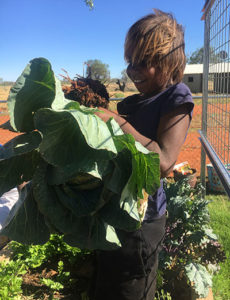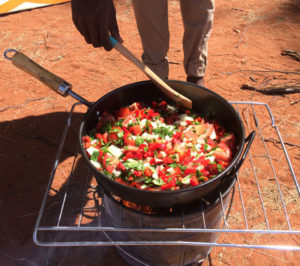Sowing good seeds to harvest great attitudes
Original article published in NT PHN Primary Health Weekly e-newsletters.
There is much to be said when three generations of one family are involved in a community gardening project. Grandparents, Josie and Dinny, are proud green thumbs who insist on inviting their daughters and grandchildren to harvest the produce altogether to cook in the garden.
They are part of a dedicated community who has embraced the idea of growing and eating their own fruit and vegetables. Arid Edge’s Amern Mwerr project in the Utopia Homelands is behind the growing involvement and enthusiasm of families participating food gardens that improves peoples’ access to fresh produce.
The project started in 2009 in the Utopia Homelands; a collection of communities located 250 kilometres northeast of Alice Springs. With no central community and challenges to receive regular produce supplies, Utopia was identified as an area of need. Arid Edge Environmental Services has been working with community members since 2014 to develop the gardens, and teach local families gardening skills and simple recipes to encourage healthy eating.
 The seasonal fruit and vegetables continually harvested from the gardens is testament to the hard work and commitment invested by the community members. Summer yields melons, pumpkins, broccoli and mulberries – a popular fruit with the children, while oranges have become an anticipated fruit in winter. Kale is a year- round staple that features in many of the delicious and healthy recipes that have been created as part of the program to address chronic health conditions such as anaemia.
The seasonal fruit and vegetables continually harvested from the gardens is testament to the hard work and commitment invested by the community members. Summer yields melons, pumpkins, broccoli and mulberries – a popular fruit with the children, while oranges have become an anticipated fruit in winter. Kale is a year- round staple that features in many of the delicious and healthy recipes that have been created as part of the program to address chronic health conditions such as anaemia.
Over the years, communities have implemented water methods to suit the climate of Central Australia. In 2014, NT PHN commissioned Arid Edge Environmental Services to install wicking beds – an efficient bottom-watering system for garden beds that channels water directly to the roots to reduce evaporation.

Stories from the homeland communities include families adding fresh herbs to their bolognaise, encouraging their children to cook, silverbeet and kale being harvested for dinner, people sourcing their own seeds to plant tomatoes and even using a kale leaf to wrap around a sausage for a healthy hot dog.
The program also offers work experience opportunities in the homelands through joint funding with My Pathway (Community Development Remote Jobs and Communities Program) where residents harvest the fruit and vegetables, maintain the gardens and re-plant for the new season.
Regular cook-ups run by Arid Edge’s nutrition worker harvest produce from the gardens to teach simple healthy meals, with a particular focus on engaging women and children. As the popularity of the project grows, more families are cooking the projects recipes and requesting gardens.
Since it was first established in 2009, the Amern Mwerr project in Utopia has grown to support 13 productive gardens across 10 homelands – having been planned, designed and built with community members on different outstations.
ABC Radio article: Small scale farming in remote Indigenous communities continues despite the loss of direct government funding
(9 September 2015)
Amern Mwerr (Good Food) Project Partners:
My Pathways (RJCP Provider)
Primary Health Network (PHN)
Health Network NT
Tags: services-foodsecurity